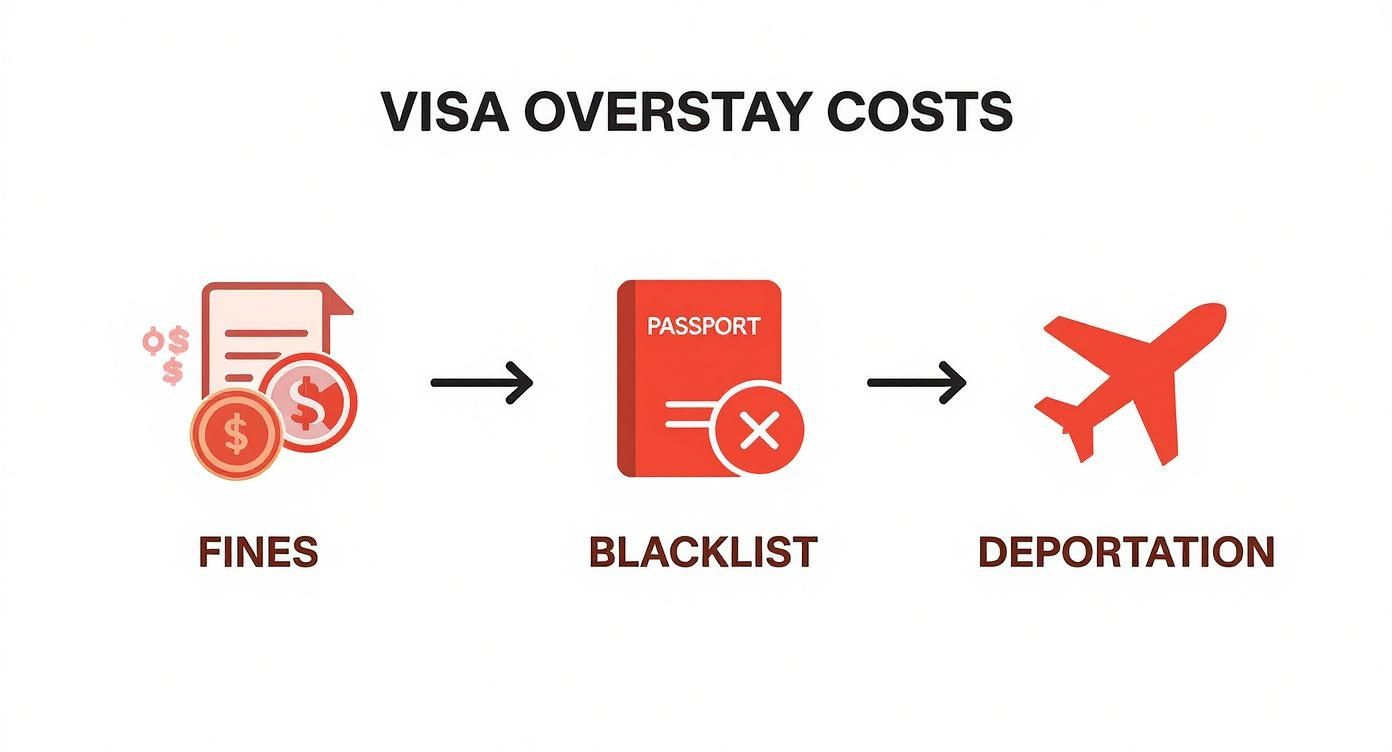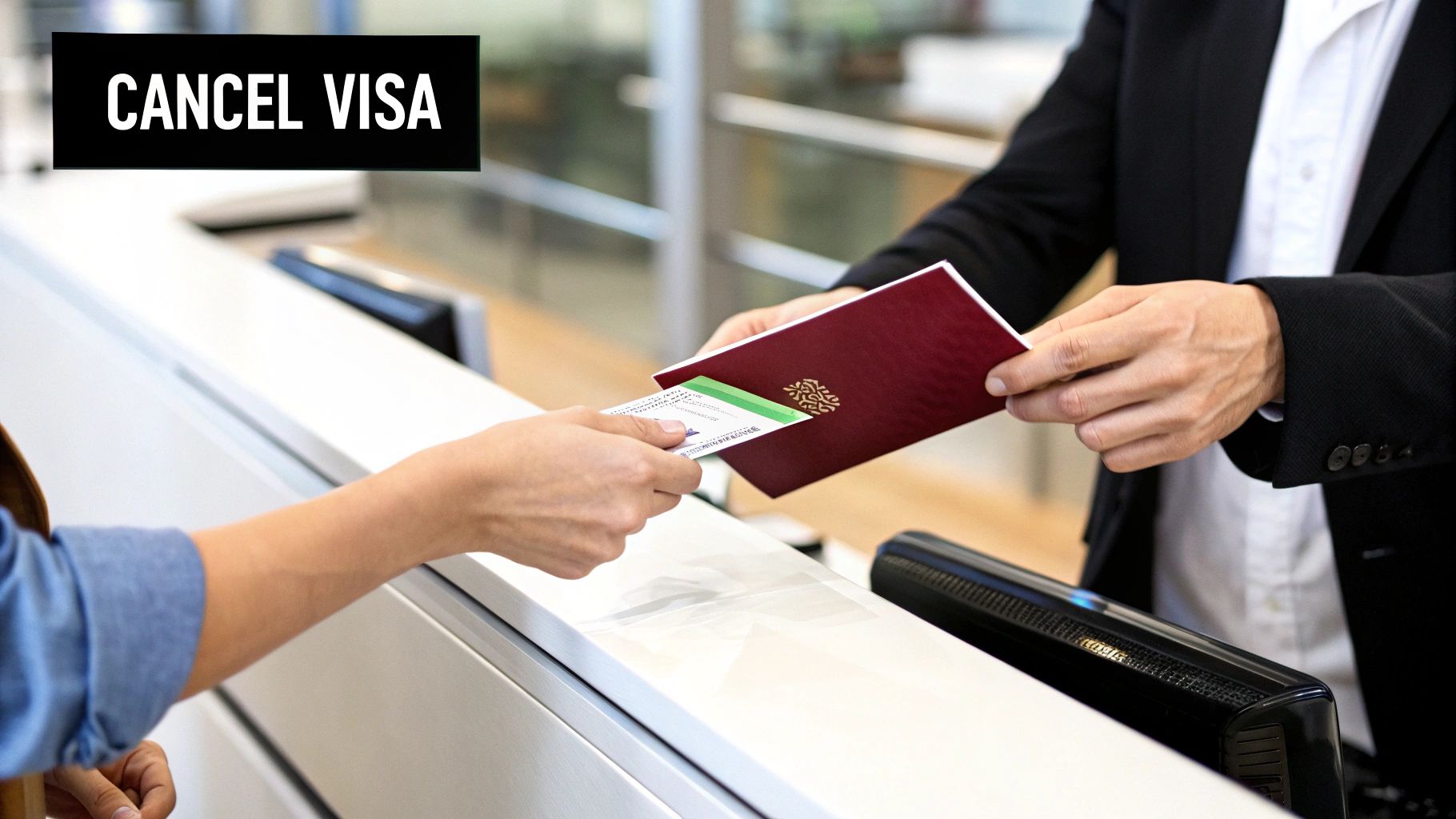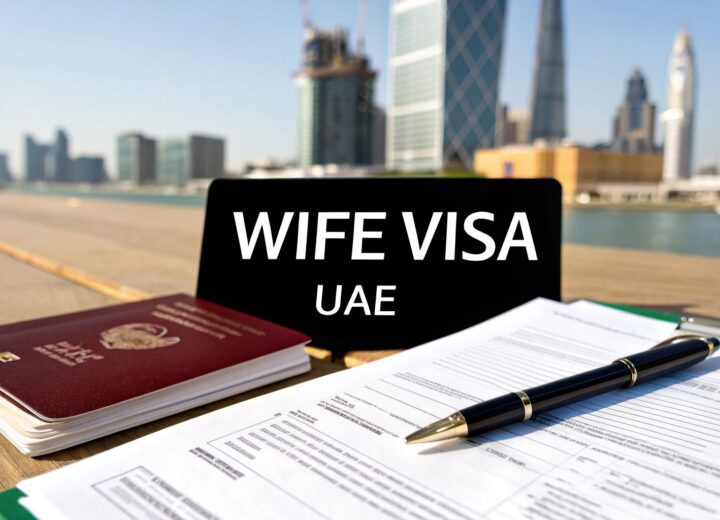So, your UAE residence visa is about to expire. The good news is you don't have to pack your bags and leave the country the very next day. The government provides a grace period, which is essentially a safety net that gives you some breathing room to either get your visa renewed or sort out your affairs before you depart, all without facing any penalties.
This crucial window can be anywhere from 30 to 180 days, but it all comes down to your specific visa category.
Understanding Your UAE Visa Grace Period
Think of the grace period as a buffer zone for your legal status here in the UAE. It's a set amount of time that kicks in the moment your residence visa officially expires. The whole point is to help you manage everything without the immediate stress of being an overstayer.
Figuring out the exact length of your grace period is the first and most important step in handling your visa expiry correctly. If you ignore this period, you could be looking at daily fines and other legal headaches. So, as your visa's expiry date gets closer, your top priority should be confirming the grace period tied to your visa type. Knowing this sets you up for a smooth process, whether you're planning to stay or go.
Different Visas Mean Different Rules
The UAE’s visa system isn’t a one-size-fits-all deal, and that definitely applies to grace periods. The rules can change quite a bit depending on the kind of residency you hold. For example, a standard employment visa from a mainland company might have a different grace period than one issued by a freezone.
Likewise, the long-term residency options come with their own set of conditions. Getting these distinctions right is key to staying compliant.
- Employment Visas: These standard work visas usually come with a 30-day grace period. This gives both you and your employer a decent window to get the renewal paperwork done.
- Investor Visas: These can sometimes have more flexible terms, which makes sense given the holder's economic contribution to the country.
- Golden Visas: If you're a holder of the 10-year Golden Visa, you're in luck. You get a lot more flexibility, often with grace periods up to six months, which provides significant peace of mind.
- Green Visas: These five-year visas for freelancers and skilled professionals also offer a generous six-month grace period after the visa expires or is cancelled.
To make this a bit clearer, here's a quick look at the typical grace periods for some common visa types.
Quick Overview of Common UAE Visa Grace Periods
This table summarises the typical grace periods you can expect for some of the most common UAE residence visas.
| Visa Type | Typical Grace Period After Expiry | Primary Action Required |
|---|---|---|
| Standard Employment Visa | 30 days | Renew with employer sponsorship or cancel and depart. |
| Family Visa | 30 days | Renew under sponsor's visa or cancel and depart. |
| Investor/Partner Visa | 30-90 days | Renew company licence and personal visa. |
| Golden Visa | 6 months (180 days) | Renew based on Golden Visa criteria. |
| Green Visa | 6 months (180 days) | Renew based on Green Visa criteria (e.g., self-sponsorship). |
Remember, these are typical timelines, and it's always best to confirm the specifics for your individual situation.
Your visa type is the single most important factor determining your grace period. Always verify the rules applicable to your specific residency, whether it’s a standard work permit, an investor visa, or a long-term Golden Visa.
Nailing this down from the start is fundamental. Before you even think about the renewal or cancellation process, you need to know your timeline. This knowledge empowers you to make the right decisions and avoid the stress and cost of getting it wrong. Since the rules can vary between mainland, freezone, and special visas, getting advice from professional corporate PRO services can be a huge help in making sure every step is handled correctly.
The Real Cost of Overstaying Your Visa
Letting your visa's grace period slip by isn't just a simple admin error. It's a mistake that kicks off a chain of serious, and often costly, consequences. The first thing you'll notice is the financial hit: daily fines start racking up the very next day after your grace period expires. These penalties are designed to be a strong deterrent, and they escalate fast.
What might seem like a small amount at first can quickly snowball into a major financial headache. It's not uncommon for these fines to run into thousands of dirhams in just a matter of weeks. This creates a stressful and expensive situation that was completely avoidable. Knowing the UAE residence visa expiry rules isn't just about ticking a box for compliance—it's about saving yourself from a world of financial pain.
Beyond the Daily Fines
The penalties for overstaying go well beyond your wallet. The longer you stay in the UAE without a valid visa, the more serious the situation becomes. If you ignore the growing fines, the authorities can take more serious legal action, turning what was a simple residency issue into a complex legal battle.
This is where the problem starts affecting your entire future in the region. The UAE's immigration system is efficient and enforcement is taken very seriously. A clear record is kept for all residents and visitors, and having an overstay on your file is a major red flag.
To give you an idea of how seriously this is taken, consider the official figures. In the first half of one recent year, authorities identified over 32,000 visa violators, with many of them facing deportation. This really drives home the importance of renewing your visa or leaving the country on time. You can dig deeper into these enforcement statistics and see the full report on visa compliance.
The Risk of a Travel Ban and Blacklisting
One of the heaviest consequences of overstaying is getting blacklisted. This is exactly what it sounds like: you're barred from entering the UAE in the future. A travel ban can be temporary or, in serious cases, permanent.
Being blacklisted doesn't just shut the door on the UAE. Because of information-sharing agreements between Gulf Cooperation Council (GCC) countries, a ban here could throw up major roadblocks if you ever try to get a visa for neighbouring nations like Saudi Arabia, Oman, or Qatar.
An overstay fine is a warning; a travel ban is a long-term barrier. Proactively managing your visa status is essential to keep your options open for future opportunities across the entire Gulf region.
Deportation and Its Implications
If someone racks up a huge amount in fines or is caught working illegally after their visa has expired, deportation becomes a very real threat. This is the official process where the authorities formally remove you from the country.
Deportation is a serious step that comes with an automatic entry ban, which is often for life. It means you can't come back to the UAE, not even for a holiday on a tourist visa. This can completely upend personal and professional lives, separating families and bringing an abrupt end to careers built in the country. The process is stressful and leaves a permanent stain on your immigration record. This is why professional support, like corporate PRO services, is so crucial—they ensure you navigate renewals and cancellations correctly, avoiding these severe outcomes. For businesses, this is especially critical, as having key staff face deportation can throw a wrench into the entire operation.
Your Step-by-Step Visa Renewal Guide
Renewing your UAE residence visa can feel like a daunting task, but if you break it down into simple, manageable steps, the whole process becomes much clearer. Getting a head start is the best way to steer clear of any fines or penalties that come with an expired visa. The system is designed to be straightforward, making sure all your legal, medical, and identification details are kept current.
Your sponsor, whether that's your company or a family member, can get the ball rolling on your renewal application up to 30 days before your current visa is set to expire. This is the perfect window to begin gathering your paperwork and booking appointments. Treat it like a checklist, and you'll turn a potentially stressful deadline into a simple to-do list.
This guide will walk you through every critical stage, from getting your application in, right through to getting that new visa sticker in your passport. Following these steps will ensure you stay fully compliant and secure in your residency status.
Stage 1: Gathering Your Essential Documents
Before any applications can be sent off, you and your sponsor need to get a specific set of documents together. Think of this as laying the foundation for your renewal; without these papers, you can't move forward. It’s absolutely vital that everything is accurate and complete.
Here’s what you’ll generally need:
- Original Passport and a Copy: Double-check that your passport is valid for at least six more months.
- Recent Passport-Sized Photographs: These need to follow the official UAE government rules, which usually means a white background.
- A Completed Application Form: Your sponsor or a PRO service will typically handle this for you.
- Your Original Emirates ID Card: You'll need this for the renewal process.
- A Valid Company Card and Trade Licence: Your employer will provide copies of these.
- Medical Fitness Test Results: Anyone over the age of 18 has to pass a medical screening.
- Proof of Health Insurance: In the UAE, having a valid health insurance policy is mandatory for all residents.
Having all these documents organised and ready to go will save you from frustrating delays and make the next steps a whole lot smoother.
Stage 2: The Medical Fitness Test
For anyone over 18, the mandatory medical fitness test is a crucial part of the renewal process. This screening checks for certain communicable diseases and is a public health measure. You must get this test done at a government-approved health centre.
The process itself is usually pretty quick. You'll visit a designated clinic, give them your details, and have a blood test and a chest X-ray. The results are typically sent electronically straight to the immigration authorities within a couple of days.
Don't forget, a "passed" medical certificate is non-negotiable for renewing your residence visa. It's a smart move to book this appointment as soon as your renewal window opens to keep everything on track.
Stage 3: Emirates ID and Visa Stamping
Once your medical results are in and you've got the all-clear, the next step is to renew your Emirates ID. Your sponsor will submit the application to the Federal Authority for Identity, Citizenship, Customs and Port Security (ICP). This is often done at the same time as the visa renewal application itself.
After all the required documents are submitted—including your medical certificate and the Emirates ID application receipt—the immigration authority will review your file. Once approved, your passport will be stamped with the new residence visa. This is typically valid for another one or two years, depending on your employment contract and visa type.
The final piece of the puzzle is receiving your new Emirates ID card, which will be sent to you after the visa is stamped. This card is your main form of identification in the UAE, so keeping it valid is just as important as the visa in your passport. For a more detailed look at the paperwork and timelines, you can learn more about the complete UAE visa renewal process in our dedicated guide.
This infographic shows the escalating consequences of failing to renew your visa, from initial fines to more severe legal actions.

The visual flow underscores how ignoring visa expiry rules leads to increasingly serious outcomes, reinforcing the importance of timely renewal.
How to Properly Cancel Your Residence Visa
Leaving a job or deciding to move on from the UAE involves more than just booking a flight. You absolutely have to make sure your residence visa is properly cancelled. Think of it like formally closing a bank account; if you just walk away, it can lead to some serious headaches later on, like being reported as absconding or racking up fines you didn't even know about.

This formal cancellation process is what officially clears your name from the immigration system. It's how you ensure you leave with a clean record, and it's a non-negotiable step for anyone ending their residency here, no matter the reason. Knowing how this works is just as vital as understanding the renewal rules.
The Sponsor Is Responsible for Cancellation
Here in the UAE, the responsibility for kicking off the visa cancellation process falls squarely on your sponsor's shoulders. For most of us, that's our employer. If you're on a family visa, then the main visa holder—like your spouse or parent—is the sponsor and needs to get the ball rolling.
The sponsor will submit a formal cancellation request to the relevant immigration authority, which will either be the General Directorate of Residency and Foreigners Affairs (GDRFA) or the Federal Authority for Identity, Citizenship, Customs and Port Security (ICP). They’ll need a few key things from you to get it done.
- Your Original Passport and Emirates ID: These are needed for the physical cancellation stamp and to formally deactivate your ID.
- A Signed Cancellation Form: This is an official document that both you and your sponsor have to sign.
- Clearance Letters: In some cases, you might need letters confirming you have no outstanding payments, for instance, from your bank or landlord.
Once the application gets the green light, your passport is stamped with the cancellation, and your Emirates ID is deactivated. That's it—your residency status is officially over. It can feel like a lot to manage, which is why many people and companies use professional PRO services to make sure every step of the visa cancellation procedure in the UAE is handled perfectly.
Cancellation Inside vs Outside the UAE
The process has a couple of slight variations depending on whether you're physically in the UAE when it happens.
Cancelling from Inside the UAE: This is the standard way and by far the most straightforward. You're in the country while your sponsor handles the paperwork. As soon as it's completed, you're given a 30-day grace period to either leave the country or sort out a new residence visa with a new sponsor.
Cancelling from Outside the UAE: Now, what if you've already left the country without getting your visa cancelled? Maybe you resigned while on holiday abroad. Your sponsor can still cancel it in your absence, but it can be a bit more complicated and sometimes requires extra steps. It's always best to complete the cancellation before you fly out for good to avoid any potential snags if you try to re-enter the UAE in the future.
Visa Renewal vs Cancellation Key Differences
To make things crystal clear, it’s helpful to see renewal and cancellation side-by-side. Each process serves a very different purpose, and knowing which is which is crucial for staying on the right side of the law.
| Aspect | Visa Renewal | Visa Cancellation |
|---|---|---|
| Purpose | To extend your legal residency in the UAE. | To formally end your legal residency in the UAE. |
| Timing | Initiated before the current visa expires. | Initiated upon termination of employment or decision to leave. |
| Outcome | You receive a new visa stamp and can continue living in the UAE. | Your residency is terminated, and you must exit within the grace period. |
At the end of the day, whether you're renewing an investor visa or cancelling an employment visa, following the proper procedures is the key to maintaining a good standing with the UAE authorities.
Rules for Golden Visas and Other Special Categories
The UAE’s residency landscape is definitely changing. We’re seeing a big shift away from the standard two-year work visa towards more long-term, stable options for people who bring real value to the country's economy and culture. These special categories, like the popular Golden and Green Visas, play by a different set of uae residence visa expiry rules, giving you a level of security and flexibility that just wasn't possible before.

Think of it this way: traditional employment visas tether you to a single employer. These new pathways are designed to attract and keep global talent, investors, and entrepreneurs here for the long haul. It’s a strategic move to build a sustainable, knowledge-based economy by making long-term residency a major perk for innovation and investment.
The Prestigious 10-Year Golden Visa
The Golden Visa is really the crown jewel of the UAE's residency programmes. It offers a massive 10-year renewable visa, a game-changer for anyone tired of the constant two-year renewal cycle. This visa is typically granted to exceptional talents, scientists, top-tier professionals, and major investors. Its biggest selling point is the stability it offers.
Here’s what makes the Golden Visa’s rules stand out:
- Extended Validity: With a 10-year duration, renewals are few and far between. This lets you genuinely plan your personal and professional life with a much greater sense of certainty.
- Generous Grace Period: If your Golden Visa expires or is cancelled, you get a lengthy six-month (180-day) grace period. This is a huge relief, giving you plenty of time to sort out your affairs, apply for renewal, or switch to another visa.
- Freedom of Movement: Unlike standard visas that can be cancelled if you're out of the country for more than 180 days, Golden Visa holders can stay abroad for extended periods without risking their residency.
This programme isn't just a concept; it's incredibly popular. The number of Golden Visas issued shot up from 47,150 to 158,000 in just two years. This surge was largely thanks to smart, investor-friendly policy updates that made it easier for people to qualify.
The Flexible 5-Year Green Visa
Another fantastic innovation is the Green Visa. This is a five-year residency option aimed at skilled professionals, freelancers, and the self-employed. It perfectly bridges the gap between the standard two-year visa and the elite 10-year Golden Visa. The most important feature? It's self-sponsored, meaning your residency isn't tied to one specific employer.
The Green Visa empowers skilled individuals by giving them control over their residency status. It allows professionals to explore multiple work opportunities or build their freelance careers without being tied to a single sponsor.
This self-sponsorship model is a massive deal. For freelancers, it means they can legally juggle multiple clients. For skilled employees, it offers the freedom to change jobs without the stress of their visa being immediately cancelled, as long as they secure a new role within the grace period.
Just like the Golden Visa, the Green Visa comes with a substantial six-month (180-day) grace period after it expires or is cancelled. This extended timeframe provides a real safety net, giving you the time you need to figure out your next steps. As specialists in long-term residency, we can help you figure out if you qualify. To learn more, check out our detailed guide on Golden Visa eligibility in the UAE.
Navigate UAE Visa Rules with Expert Help
So, you've seen just how tricky the UAE's residence visa expiry rules can be—from shifting grace periods to some pretty serious penalties. Getting a handle on these requirements is absolutely essential for anyone living or doing business here. A tiny oversight isn't just a minor headache; it can lead to major financial and legal trouble.
This is exactly where getting some professional guidance really pays off.
Trying to navigate the UAE's legal landscape on your own is a tall order. Our team is here to make sure you steer clear of expensive mistakes, save your valuable time, and stay completely compliant with every single regulation. We get into the weeds of the details so you can focus on what's most important—your life and your business in the UAE.
Your Partner for a Smooth Residency Journey
✅ Specialists in Mainland Company Formation in Dubai, Sharjah & Abu Dhabi
✅ Specialists in Freezone Company Formation across the UAE
✅ Specialists in Golden Visa on Property and Investor Visa
✅ Specialists in Corporate PRO Services and Attestation Services
✅ 24/7 Support Service – Always here when you need us
✅ Cost-Effective Business Setup Solutions tailored to your needs
✅ Enjoy UAE Tax Benefits for International Entrepreneurs
📞 Call Us Now: +971-54-4710034
💬 WhatsApp Us Today for a Free Consultation
Got Questions About Your Visa Expiry? We Have Answers
Even with the clearest rules, real-life situations often throw a curveball. When it comes to UAE residence visas, you might find yourself with specific questions that don’t quite fit the standard mould. Let’s tackle some of the most common queries people have to make sure you stay on the right side of the law.
What Happens If My Visa Expires While I Am Outside the UAE?
This is a big one. If your residence visa expires while you’re abroad, you can’t simply fly back into the UAE. The old visa is no longer valid for entry.
Your sponsor will need to go through the official process of cancelling the expired visa. After that's done, you'll most likely need a new entry permit to be issued before you can return. It's absolutely crucial to get in touch with your sponsor before you book your flight to avoid any nasty surprises at immigration.
Also, remember the 180-day rule. For most standard residence visas, being outside the UAE for more than 180 consecutive days can trigger an automatic cancellation, though there are exceptions for special categories like the Golden Visa.
Can I Renew My Child's Visa If Their Passport Is Expiring Soon?
Simply put, no. UAE immigration authorities are very strict about this: a passport must have at least six months of validity left to process a visa renewal. There’s no wiggle room here.
Your first port of call should be your home country's embassy or consulate in the UAE to get your child’s passport renewed. Once you have the new passport in hand, you can then move forward with the visa renewal, which includes the medical fitness test if your child is of the required age.
Is the Grace Period Different for Freezone and Mainland Visas?
The grace period itself is set at a federal level by the ICP (Federal Authority for Identity, Citizenship, Customs & Port Security), so it’s generally the same whether your visa is from the mainland or a free zone. For most employment visas, you can expect a standard 30-day grace period after expiry.
However, where things can get tricky is with internal deadlines. Your free zone authority might have its own administrative timelines for when they need you to start the renewal or cancellation process. So, while you legally have 30 days to sort things out, your sponsor might need you to act sooner to avoid their own administrative headaches. Always double-check with your company or free zone contact.
It’s also worth noting how the UAE is expanding its residency options. Take the 5-year Green Visa, for instance. It's designed for freelancers, skilled employees, and investors, allowing them to sponsor themselves and offering a much more generous grace period. To be eligible, you might need to show things like a minimum annual income of AED 360,000 from self-employment for the last two years. Discover more insights about these modern visa options.
Navigating visa rules, from company formation to securing long-term residency, requires expert knowledge. At PRO Deskk, we provide cost-effective, 24/7 support for Mainland and Freezone setups, Investor and Golden Visas, and all your Corporate PRO needs. Let us handle the complexities so you can focus on growth.
📞 Call Us Now: +971-54-4710034
💬 WhatsApp Us Today for a Free Consultation at https://prodesk.ae





